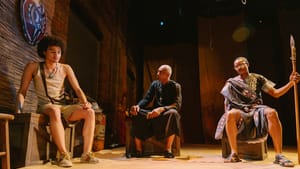Stay in the Loop
BSR publishes on a weekly schedule, with an email newsletter every Wednesday and Thursday morning. There’s no paywall, and subscribing is always free.
Still ahead of her time
EgoPo Classic Theater and Abrahamse and Meyer Productions present Lorraine Hansberry’s Les Blancs

When Lorraine Hansberry died in 1965, she left behind sketches for Les Blancs, a searing indictment of colonialism and enforced Western perspectives in Africa. EgoPo Classic Theater opens its Crossing Oceans season with a strong production that honors Hansberry’s mission without entirely solving the problem of the work’s unrealized mission. But it stands as an ideal work to usher in a series of performances that decenter an Anglo American worldview and reflect, as artistic director Lane Savadove put it in remarks on opening night, our return to being a global society.
Robert Nemiroff, Hansberry’s ex-husband and literary executor, completed the play after her death, and a brief Broadway run in 1970 followed. As with The Sign in Sidney Brustein’s Window, another late entry in her canon (which was revived in New York earlier this year), it’s impossible not to marvel at the complicated questions the playwright was asking more than a half-century ago. In many ways, Les Blancs feels as vital as anything written by the cadre of contemporary dramatists who are boldly marrying social inquiry with discursive forms, unencumbered by the traditional narrative structure. It verges on cliché to call a gone-too-soon artist ahead of her time, but in this case, no other moniker fits.
A strong center
You also cannot help but wonder what the finished product might have looked like if Hansberry had survived long enough to refine and revise it. For all its daring subject matter and exciting structural choices, Les Blancs often feels overlong and unwieldy, and certain sections seem underdeveloped and unfinished. The action bravely gives voice to multiple perspectives within the setting of Ztembe, a fictional, long-colonized African country, and it stands as a corrective to mid-century plays that presented fetishized, condescending views of Indigenous peoples. (Hansberry began working on the play after seeing a production of Jean Genet’s Les Nègres, which she found offensive and unrealistic.) At times, though, it can be hard to fully process all that Hansberry presents in the moment without the dramatic waters getting slightly muddied.
The play’s strong center, though, is Tshembe Matose, a local who left to pursue opportunities in Europe and America and whose return provides an uncomfortable marriage of the global perspectives at work in the village. Played with passionate clarity by Lungile Lallie, Tshembe understands, analyzes, and often rejects the arguments of the white settlers who populate his home country and the neighbors trapped between fighting for freedom and living in servitude. He offers wry advice to both his brothers: Abioseh (the superb Damien J. Wallace, who also co-directed the production with Fred Abrahamse), who is studying to become a Catholic priest, and the biracial Eric (Dawn McCall), born as a result of rape, who is caught between his conflicted identities.
Wallace and Abrahamse deliver a production that wades into the murky waters of Hansberry’s world without attempts to smooth the rough edges. Although the pacing falters somewhat in the long second act, the result is distinctive and often gripping and is aided by a large cast that delivers interesting, memorable characterizations. Standouts include Cheryl Williams as the wife of a missionary who understands more about the colonial mindset than she initially lets on; T.C. Cadwell as a native whose servile position disguises revolutionary urges; Annette Kaplafka as a morally dubious doctor; and Eric Kramer as a malicious army officer. As Charlie Morris, an American journalist who arrives to glorify the missionary culture but leaves disgusted, Matthew Baldwin is slightly wan, especially as a scene partner to Lallie.
An international perspective
Marcel Meyer’s production design makes good use of the performance space at Christ Church Neighborhood House, with a bisected stage area that underscores the proximity and the separation of the cultures at the center of the story. The walls are decorated with European antiques on one side of the stage and tribal shields on the other, a reminder of the differences in dialogue here. Live music also stresses this dichotomy, with Jay Ansil’s lilting violin in conversation with Karen Smith’s rhythmically driven, assertive percussion.
EgoPo Classic Theater partnered with the South African theater company Abrahamse and Meyer Productions for this staging, resulting in an international perspective too rarely seen in Philadelphia theater. Les Blancs may be cumbersome at times, but it is also a necessary play with an important message, given vivid expression here. It augurs well for a season meant to explore the narratives and voices often left out of the conversation.
What, When, Where
Les Blancs. By Lorraine Hansberry, adapted by Robert Nemiroff; directed by Fred Abrahamse and Damien J. Wallace. $20-$40. Through November 5, 2023, at Christ Church Neighborhood House, 20 N American Street, Philadelphia. (267) 273-1414 or egopo.org.
Accessibility
Christ Church Neighborhood House is a wheelchair-accessible venue. There is elevator access to the performance space, which is located on the building’s fourth floor. Private, accessible bathrooms are located on the ground floor.
Masks are not required.
Sign up for our newsletter
All of the week's new articles, all in one place. Sign up for the free weekly BSR newsletters, and don't miss a conversation.

 Cameron Kelsall
Cameron Kelsall